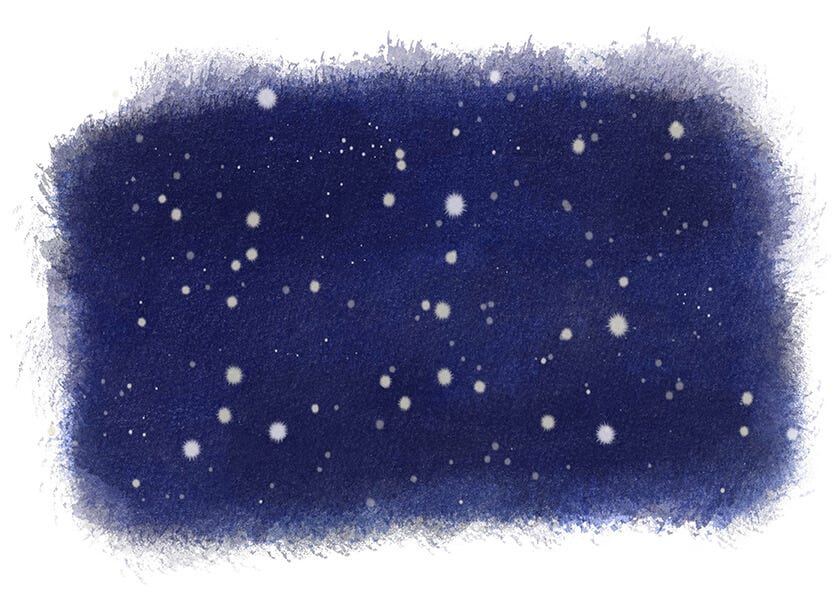At the edge of a flat field on the razor-straight northern border of Maryland and Pennsylvania, two brothers watched the violet-blue sky creep toward night.
They waited silently, necks craned heavenward. Both watched shreds of clouds drift through the halo around the moon. Light years away, stars burned and sent their ancient light sparkling in the night sky over their heads.
“Have you ever watched them move and fade over the horizon when the sun is coming?“ Matthew said. He was the older of the two by a year.
“I watch them until I’m dizzy. They move, and the sky changes. It’s never just night. There isn’t just one color when the sun goes down. What do you see now?“ Oliver asked.
“Where? Anywhere in the sky?“ Matthew looked from left to right.
Oliver nodded toward his older brother but did not wait for a response. “I like to look at the edge of the sky, just above the tree line, and move across toward my left. I catch glimpses of how dark the sky is and the brightness of the stars if I don’t look directly at them. I see them clearer somehow. The harder I look, the less I see.”
“What do you think is out there?“ Matthew asked.
“Other than the stars, you mean?“ Oliver paused. “I like to think the sky is a liquid blue bowl full of dust, flecks of paint, sand, light—and I’m hanging onto the world so I don’t fall in. But I want to. I want to dive in. I think I’d fall forever.“
Matthew shook his head. Though dark, the moon and stars were bright, and Oliver saw his brother clearly in the milky blue.
“I don’t know, Matthew . . . stars, planets, the solar system, darkness, ice. Nothing like what we have here. This," he waved his arms, "is the center of it all. There could be a countless planets, rocks, asteroids, but we are on the one that matters.”
Matthew winced. “You sound sure of yourself, Oliver. But there’s no way to tell, is there?“
“Yes, I think there is. Just look around. As beautiful and frightening as space may be, I wouldn’t trade it for a tree. It’s green, solid, alive, breathing in and out in its way.”
“A tree?” Matthew asked skeptically.
“Yes, I think so. Trees grow; they wave in the wind, but a tree doesn’t move like the stars.” Oliver said.
“The stars don’t move, Oliver, we do. We spin and rotate around the sun. You know that.”
“That’s not what I mean, Matthew. Tonight, while we stand here, those stars will move across the sky—our sky. They are there for us. They move for us, even if we are spinning at a million miles a second. Even if we are not at the center of a map, we are the reason for it.” Oliver‘s confidence was as firm as bedrock.
Matthew bent down and picked up a stick. He swung it in an arc near his side and threw it into the darkness. Looking at the top of the trees, dark and full nearby, he thought about Oliver and the vast sky beyond him. What was solid, the hard earth he was standing on, the trees, their roots breaking through rocks and soil?
He wanted to tell his brother the facts. We spin, not the stars. But as Matthew grabbed the shreds of details, they rattled like bones without sinew or muscle. Matthew had named something, but he was no closer to understanding its meaning. Oliver seemed unconcerned about details yet had grabbed the handle of reason.
Both stood quietly. The slightest breeze made the nearby trees shake with music. Oliver looked at the stars, hiking across the horizon, eyes half closed, contented. Matthew, almost always dizzy from imagining the speed of the earth whirling on its axis like a top, looked up, felt his legs strengthen, his feet root to the ground, and watched the dots of stars begin to move across the inky sky.




